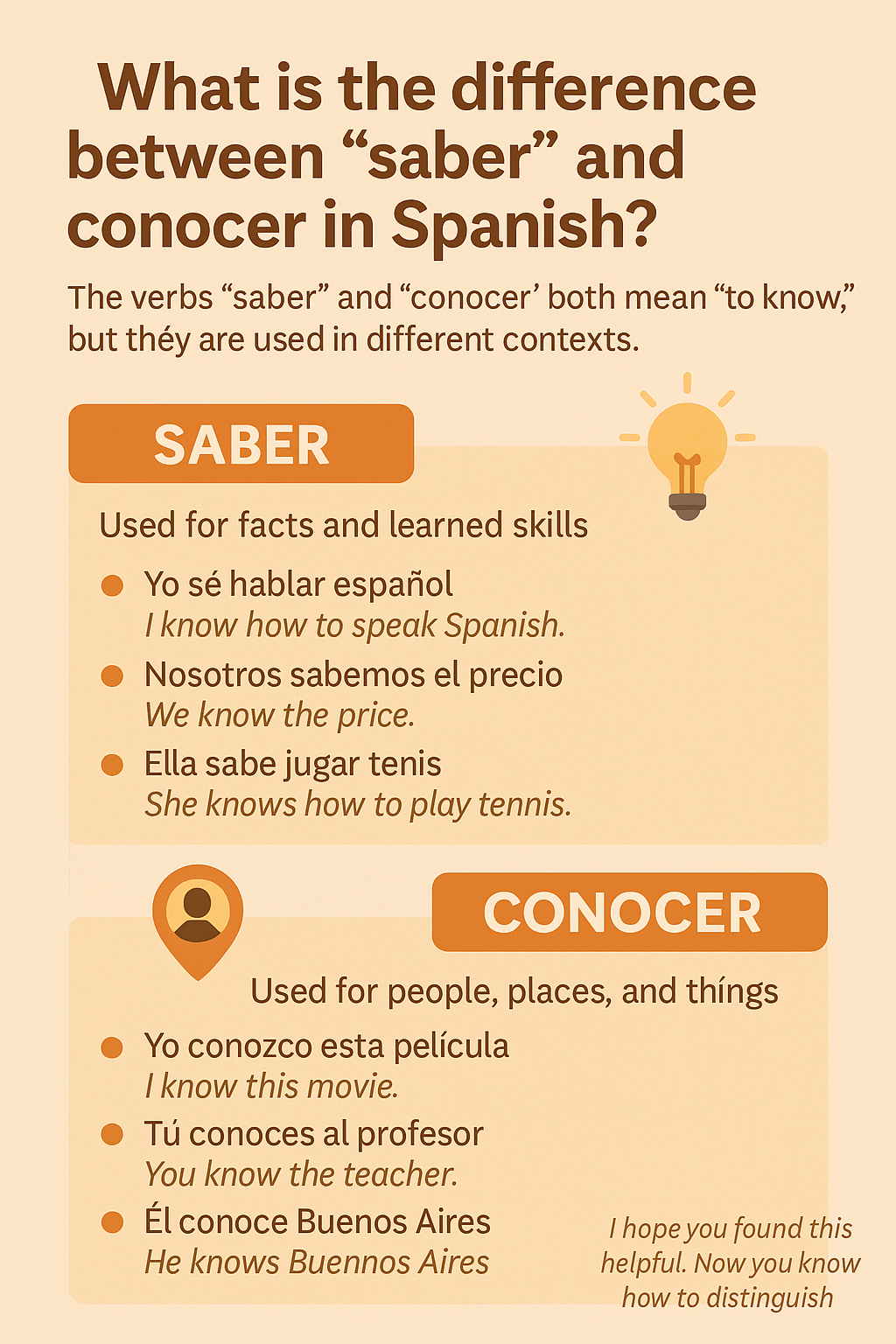What is the difference between SABER and CONCOER in Spanish?
You may think this verb means the same, and you are absolutely right! The problem is not what it means, it’s when to use it. I know, it sounds tricky at the beginning, but let me explain to you.
For those who don’t know, Saber and Conocer mean to know. Yes, we have two verbs for the same meaning, and I know in your Spanish journey you will realise there are more cases like this. But for today’s post, we will show you the difference between Saber and Conocer
Let’s start with SABER
Like I mentioned before, saber means “to know”, but when do we actually use it? Don’t worry, I’ve got you covered!
Here’s the trick: just ask yourself, what do you know? If it’s a fact, a piece of specific information, or something you’ve learned how to do, and boom! That’s when you use saber. Simple as that!
Before moving forward with the examples, let’s review the conjugations:
- Yo sé (I know)
- Tú sabes (You know)
- El sabe (He knows)
- Ella sabe (She knows)
- Usted sabe (You -formal- know)
- Nosotros sabemos (We know)
- Ellos saben (They know)
- Ustedes saben (You guys know)
- Vosotros sabeis (You guys know), Spain version.
So now, let’s go with the examples:
Let’s look at some examples so you can really see Saber in action!
- Yo sé hablar español – I know how to speak Spanish. This is a skill, see how that works?
- Nosotros sabemos el precio – We know the price. That’s a fact, a piece of specific information we’ve got.
- Ella sabe jugar tenis – She knows how to play tennis. Another skill!
- Tú sabes la verdad – You know the truth. That’s another fact… or at least, the person saying it believes it is!
- Ustedes saben cocinar muy bien – You all know how to cook really well. Yep—yet another skill!
Ok, great! We know when to use Saber, but we still need to know what the drill is with Conocer.
When to use Conocer:
Now, on the other hand, we’ve got conocer, which also means “to know.” But just like with saber, it all depends on what you know.
We use conocer when we’re talking about being familiar with people, places, or things. It’s more about being acquainted with someone or something, like, “Yeah, I know them!” or “I’ve been there!”
So, if you’re talking about knowing a person, visiting a place, or being familiar with a certain thing, conocer is your go-to verb.
Let’s review the conjugation:
- Yo conozco (I know)
- Tú conoces (You know)
- Él conoce (He knows)
- Ella conoce (She knows)
- Usted conoce (You -formal- know)
- Ellos conocen (They know)
- Ustedes conocen (You guys know)
- Vosotros conocen (You guys know), Spain version
Now, time for the examples!
- Yo conozco esta película- I know this movie. We’re not saying I know there is a movie, a fact. We’re saying I know this movie, I’m familiar with it.
- Tu conoces al profesor - You know the teacher. You know this person; you are acquainted with them. Because it’s a person, you don’t use the verb “Saber”, you use “Conocer.”
- Él conoce Buenos Aires - He knows Buenos Aires. Same thing as with people, because it’s a place, you don’t use the verb “Saber”, you use “Conocer.”
- Nosotros conocemos a toda la familia - We know the entire family. There’s no “sabemos” a la familia. Because we’re talking about people, the right verb is “Conocer”, with the conjugation “Conocemos.”
- Ellas conocen la universidad - They know the university. They know about it, they’re familiar with this place. You get it now. If it’s a place, it’s not “Saber”, it’s “Conocer.”

Memory trick:
- Saber = "Savvy" (you know stuff)
- Conocer = "Connect" (you’ve met or experienced it)
I hope you found this helpful. Now you know how to distinguish between saber and conocer. But hey! Spanish has plenty more fun pairs like this! Next time, you might want to explore the difference between Tú, Usted, and Vos.
Stay tuned to our blog and keep discovering all the amazing little details that make Spanish such a rich and fascinating language!
Got questions? Or maybe you want to try out some examples using saber and conocer? Drop them in the comments, we’d love to see what you come up with!


